Inside the bizarre, passionate world of League of Legends roleplay
League of Legends isn't known for its storytelling, but that doesn't stop these roleplayers.
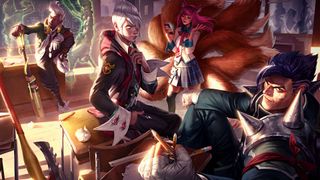
Joshua tells me he doesn't usually roleplay in-game. Summoner's Rift, the main battlefield in League of Legends, is a hellscape populated by a legion of burnouts and powergamers, each spilling vinegary conceit into 'all chat' until you remember exactly why you quit this game in the first place. Get good. Get rekt. Honestly, I can't think or a single place less inviting for introspection or immersion than League solo queue.
Sometimes, though, he'll give it a shot. The 16-year-old will join a match and, just for laughs, send a missive into chat while embodying the spirit of whatever champion he's playing (more often than not, he's playing as Kayn). "I do it just to see if anyone will try and talk to the person I'm roleplaying as," says Joshua. "And to spread the word about roleplaying in a way."
I met Joshua on one of the scattered League of Legends roleplay Discord channels, where he and a few friends dream up their own Runeterra war stories.
Character study
Roleplaying isn't for everyone, and sometimes [other players] resent us. But they do what they want and I do what I want.
Joshua
If you don't know what roleplaying is in the context of multiplayer videogames, I can best describe it as a malleable, communal fanfiction community. If I go to, say, the official World of Warcraft roleplaying forum, I'll find a bastion of players filling out the finer details of their characters' stories before colliding with the priorities and nuances of other players' creations. The idea is that you start a thread, describe the scenario, and work out a collaborative, narrator-free campaign with you and whoever's interest you've piqued.
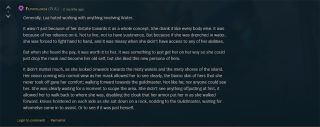
World of Warcraft empowers these fantasies even further through designated roleplaying realms. Functionally, these are the same as any other server, but the local authorities kindly encourage you to remain in character while stomping through the jungles and badlands of Azeroth. It will not surprise you to know that Riot does not offer RP servers in League of Legends.
The priorities of a MOBA are not the same as those of a sprawling MMO, and the average League player is far less acquainted with the particulars of Ashe's character than the average Warcraft player is with the plight of the Forsaken. Naturally, the Riot-ordained LoL roleplay forums are fairly sparse when compared to World of Warcraft's hub. Inside, you'll a small trickle of threads being kept alive by an eager and aggrieved community that routinely engages in the same debates you can expect from any fandom. (One look and I've already witnessed bellyaching over the character development of Ezreal.)
And so, League of Legends roleplayers tend to use their own means and their own rulesets. Joshua tells me he likes Discord for its lively, active sense of camaraderie. One look at the channel and I understand what he means. It's sparsely populated, but the dialogue that trickles through the chatbox is all improvised and in-character—which is a far cry from the turgid, Tolkien-esque exposition you find on the forums. (Alongside the general roleplay vestibule, you can find subdivisions for out-of-character talk and a room called The Tavern, which is frequented by a cavalcade of warriors who get make-believe drunk and gossip with each other in between shifts on the Rift.)
The biggest gaming news, reviews and hardware deals
Keep up to date with the most important stories and the best deals, as picked by the PC Gamer team.
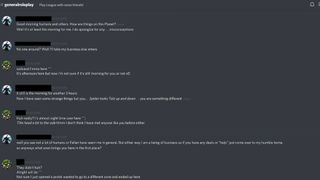
Joshua says that each roleplayer usually commandeers the perspective of a specific champion, rather than their own creation, which stands at odds with the character sheet self-direction of Dungeons & Dragons. I found that kind of charming and playful when compared to the solemnity of other RP scenes. As I spelunked through different Discords, I found a (now-abandoned) server where, from what I could glean, you were supposed to imagine yourself as a college student who was somehow getting a degree in League of Legends. (Obviously, it was called 'League Campus.')
Beyond that, I found a ton of smut. Almost every Discord I entered either enforced an outright ban on erotic roleplay or consolidated that kind of chat in a specific, grubby section of the rooms list. Of course, the most prominent, and populous channel I found was strictly dedicated to NSFW RP, and it had a shockingly robust sorting system that made sure you could find what you wanted as quickly as possible. Immediately after a player joins, they're forced to adopt a role like 'dom', 'vanilla', 'switch', or 'sub.' This let's other patrons know what to expect, so you can finally summon up your leather-daddy interpretation of Master Yi in a safe space.
This is all enthralling to me. I've been around videogames long enough to be annoyed by the dogmatic adherence some players pay to the establishment canon, so watching people go wild with League champions is exciting. Frankly, it also makes a good amount of sense when you consider the turbulent history of League lore.
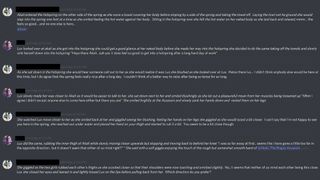
Clean slate
The new lore is quite fascinating and really good frankly, it's way better than the old stuff in almost every aspect.
Junpei
Back in 2009, when League of Legends released, it came packaged with a wafer-thin bit of world-building that earmarked the margins of the universe. I'm not an expert, but it had something to do with an endless war between two factions that gets settled by way of raucous bloodsport (that's what the League part of League of Legends means). It was fine. It got the job done.
But in 2014, as LoL's popularity was exploding and Riot was emerging as the multinational conglomerate we know it as today, the company made the bold decision to retcon its entire universe and start from scratch. "At a very broad level, we’ve decided to push League’s story beyond its original focus on explaining in-game action and forge a new narrative path for Runeterra," wrote an even-keeled Tommy Gnox in a blog post announcing the changes. "We aim to expand the scope of League’s story and pursue a more dynamic and wide-ranging world fit for the outsized capabilities and personalities of our champions."
Some people in the roleplay community were happy with the overhaul. "Before the updates we had to figure out everything for ourselves," says a 23-year old Hungarian RPer over Discord. "We couldn't be sure if [the lore] was really how it really was, or if it was just in our head-canons." Others, like a user named Junpei, felt betrayed. "I fell in love with the old lore," he says. "There were a ton of [fan] theories—Riot loved to leave mysteries and open doors for future plot points back then—and most were dropped when the lore rebooted, sadly. My inner lore geek felt really sad and upset when Riot announced the reboot. I was super angry at them, I remember even leaving the game for a while."
Junpei was eventually won back after Riot unveiled the "Universe" tab on the League website—where you can click around a fully-interactive map of Runeterra and digest thoughtfully-constructed short stories and biographies that feature the game's ever-swelling cast of champions. It represented the first time Riot has ever made a significant investment into its own cosmos, as well as a genuine hat-in-hand peace offering to its small, sturdy cadre of roleplayers. "The new lore is quite fascinating and really good frankly, it's way better than the old stuff in almost every aspect," he admits.
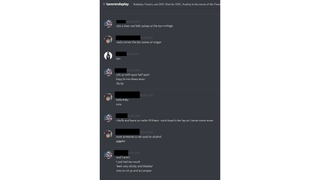
But Junpei maintains that the original lore had its charms. The vagueness of those first storylines fostered a sense of wonder. There were fewer rules, so fans could come up with their own ways to broker détente between their favorite characters. A lot of that, explains Junpei, can be chalked up to the game's initial concept, a League of Legends—where heroes were constantly interacting with each other in the trans-dimensional locker room. The world was small and navigable, everyone knew everyone else's name, and that creates a ripe setting for roleplay. The retrofitted lore dashed away that simplicity for something far more complex. "Each character [now] lives in its own part of Runeterra," continues Junpei. "Some even live in the past, which makes making stories where these characters meet way less plausible and fun."
I seriously doubt Riot employed a sense of ambiguity in the first incarnation of its lore as a clerical decision. But that's the thing with authored content: Some people are always going to be more happy with the conclusions they reach on their own, rather than your well-intentioned twists and subversions. This is especially true for something like League of Legends—the most dedicated fans love these heroes enough to literally embody them, rather than crafting their own characters in other realms.
I hope that the few, proud League roleplayers continue to chart their own path. It's nice to know that when you're caught in the poisonous morass of solo queue, there is at least someone out there considering what Anna thinks about this mess. Roleplayers are often the most underserved parts of a game's community, but in Riot's case, they also represent League of Legends at its most pure. Finally, someone to root for.
"Roleplaying isn't for everyone, and sometimes [other players] resent us," says Joshua. "But they do what they want and I do what I want. So it all works out."

Luke Winkie is a freelance journalist and contributor to many publications, including PC Gamer, The New York Times, Gawker, Slate, and Mel Magazine. In between bouts of writing about Hearthstone, World of Warcraft and Twitch culture here on PC Gamer, Luke also publishes the newsletter On Posting. As a self-described "chronic poster," Luke has "spent hours deep-scrolling through surreptitious Likes tabs to uncover the root of intra-publication beef and broken down quote-tweet animosity like it’s Super Bowl tape." When he graduated from journalism school, he had no idea how bad it was going to get.
Most Popular


